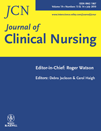Thinking ‘taller’: sharing responsibility in the everyday lives of children with asthma
Abstract
Aims. To explore negotiation of responsibilities for asthma self-care between a group of preadolescent children aged 7–12 and their parents/carers and to explore the meaning of responsibility to these children and their adult carers.
Background. Living with asthma requires the distribution of a range of responsibilities between children and their adult carers, highlighting tensions between protection and promotion of autonomy. Previous studies have identified diverse factors associated with transfer of responsibility but a better understanding is required of the meaning of responsibility in children’s lives and how parents and children negotiate responsibilities.
Design. The design was qualitative.
Methods. Eighteen child participants aged 7–12 years and their parents/carers participated in open-ended, conversational-style interviews. The framework approach was used to analyse the data and interpretation of data drew upon both feminist epistemology and sociological understandings of children, health and the body which relocate subjective experience at the heart of scientific enquiry.
Results. Children demonstrated responsibility by avoiding asthma exacerbators and limiting the effect of asthma on themselves and their parents but there were limitations on children’s opportunities to exercise some responsibilities.
Conclusions. It is possible to consider responsibility as the exercise of agency by children rather than simply as compliance with adults’ instructions and prescriptions.
Relevance to clinical practice. Some parents would like more assistance from health professionals in managing the process of increasing independent self-care by children. It is important to maintenance of the health of children with long-term conditions that the distribution of responsibilities between adults and children both ensures children’s safety and provides appropriate preparation for independence in adult life. Understanding the process by which parents and children negotiate distribution of responsibilities for long-term conditions could provide a basis for development of interventions to respond to parents’ requests for more professional support for managing this process.




